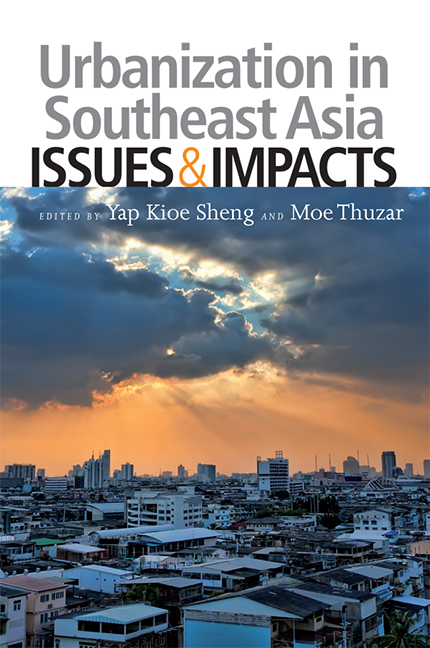Book contents
- Frontmatter
- Contents
- Message from Head, ASEAN Studies Centre
- Message from Director, Centre for Liveable Cities
- About the Contributors
- Introduction
- Urbanization in Southeast Asian Countries: Recommendations
- 1 The Challenges of Promoting Productive, Inclusive and Sustainable Urbanization
- Cities as Engines of Development
- Inclusive Cities
- Cities and the Environment
- 9 Climate Change and Southeast Asian Urbanization: Mitigation and Adaptation Considerations
- 10 Urban Green Spaces and Liveability in Southeast Asia
- 11 Decentralized Waste Water Management for the Waste Water Revolution in Urban Areas to Support the Engines of Development in Southeast Asia
- Governance, Decentralization, and Urbanization
- Urbanization from an ASEAN Perspective
- Index
11 - Decentralized Waste Water Management for the Waste Water Revolution in Urban Areas to Support the Engines of Development in Southeast Asia
from Cities and the Environment
Published online by Cambridge University Press: 21 October 2015
- Frontmatter
- Contents
- Message from Head, ASEAN Studies Centre
- Message from Director, Centre for Liveable Cities
- About the Contributors
- Introduction
- Urbanization in Southeast Asian Countries: Recommendations
- 1 The Challenges of Promoting Productive, Inclusive and Sustainable Urbanization
- Cities as Engines of Development
- Inclusive Cities
- Cities and the Environment
- 9 Climate Change and Southeast Asian Urbanization: Mitigation and Adaptation Considerations
- 10 Urban Green Spaces and Liveability in Southeast Asia
- 11 Decentralized Waste Water Management for the Waste Water Revolution in Urban Areas to Support the Engines of Development in Southeast Asia
- Governance, Decentralization, and Urbanization
- Urbanization from an ASEAN Perspective
- Index
Summary
Untreated sewage is one of the main causes for deteriorating water bodies in urban areas of Southeast Asia, and is leading to a complete neglect of these once beautiful environments and undermining the engines of development and growth in one of the most dynamic regions of the globe. Due to climate change, increasing demand for water as a result of urbanization, and other demographic and economic trends, the available per capita water in a given watershed area is rapidly dropping in many parts of the world, including Southeast Asia.
At the same time, the production of waste water in total and per capita is significantly increasing. This problem will become even more acute if the supply of safe drinking water to households and its consumption continue to increase at the current pace. An increase in water supply will result in an increase in sewage, which, without proper treatment, will end up untreated in the nearest water body or aquifer. By now the natural self-purification processes in water bodies have been exhausted and the receiving waters have partly become open sewers.
The goal for many cities and towns is to stop the discharge of untreated sewage into water bodies by treating the sewage at the source at the household and neighbourhood level. Returning a water body to its former pristine or more semi-natural state is a challenging undertaking. There is still hope, as water fronts at large and impressive rivers have become major attractions in many cities (for example, Singapore, Phnom Penh) and are now a focus of upscale development. Smaller urban water courses are, however, severely neglected. These water bodies once provided opportunities for cultivation and fishery, recreation, open space, and areas for water storage during flood seasons, but also served as effective drainage system during heavy downpours.
River training works started early and can be dated back to at least two thousand years ago. Many rivers became harnessed on a large scale during the late nineteenth and twentieth centuries. More and more small to medium-sized watercourses were trained as cities expanded. This trend is still ongoing today. Excessive river training and the discharge of liquid and solid wastes into rivers have led to a significant deterioration of many water bodies, and are affecting most urban streams.
- Type
- Chapter
- Information
- Urbanization in Southeast AsiaIssues and Impacts, pp. 277 - 290Publisher: ISEAS–Yusof Ishak InstitutePrint publication year: 2012



